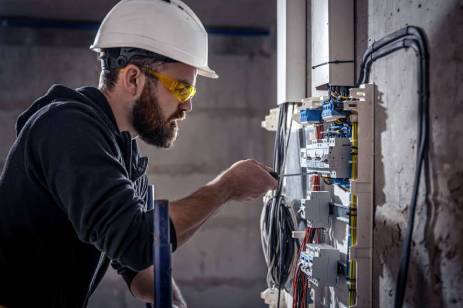A Crucial Guide to Staying Safe.
Electricity is an essential part of our daily lives. It powers our homes, businesses, and many of the devices we rely on. However, it’s important to remember that electricity can also be dangerous if not handled properly. In this blog, we’ll explore key aspects of electrical safety to help ensure that you and your loved ones stay safe.
Understanding the Basics of Electricity
To appreciate the importance of electrical safety, it’s crucial to understand the basics of electricity. Electricity is a form of energy that flows through conductors, typically wires, to power electrical devices. Its strength is measured in volts, while the flow of electric current is measured in amperes (amps).
The Dangers of Electricity
Electricity poses several risks, such as electric shock, electrical burns, and fire hazards. Electric shock can occur when a person comes into contact with an energized conductor, and the severity can range from a mild tingling sensation to a lethal outcome, depending on the voltage and current involved.
Safety Tips for Home
- Inspect Electrical Cords Regularly: Check cords for damage like fraying or cracking. Replace damaged cords immediately.
- Avoid Overloading Outlets: Plugging too many devices into an outlet can cause overheating and potentially start a fire.
- Use Extension Cords Wisely: Extension cords should be a temporary solution and not a permanent fixture. Ensure they are rated for the power they are expected to carry.
- Keep Electrical Devices Away from Water: Water conducts electricity, so keep electrical appliances and cords away from water to prevent electric shock.
Safety in the Workplace
Workplace electrical safety is equally important and requires specific precautions:
- Regular Maintenance: Ensure that all electrical equipment is regularly inspected and maintained.
- Proper Training: Employees should be trained in safe handling of electrical equipment.
- Use of Protective Equipment: Use appropriate protective gear when working with electrical systems, such as insulated gloves and tools.
Dealing with Electrical Emergencies
- Do Not Touch Someone Being Electrocuted: It’s crucial not to touch a person who is being electrocuted, as you could also get shocked. Turn off the power source immediately.
- Know How to Use a Fire Extinguisher: In case of an electrical fire, use a fire extinguisher rated for electrical fires. Never use water to extinguish an electrical fire.
Conclusion
Electrical safety is not something to be taken lightly. By understanding the basics of electricity, recognizing the dangers, and following safety tips, you can significantly reduce the risk of electrical accidents in your home or workplace. Stay informed, stay cautious, and stay safe.
Remember, safety is everyone’s responsibility, and when it comes to electricity, a little caution goes a long way.











 LOOKING FOR A JOB?
LOOKING FOR A JOB?